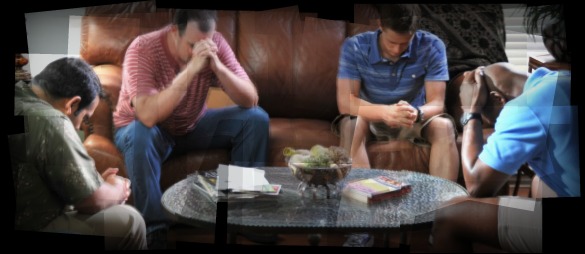Audio Interview – Focus on the Family “Exposing the Dark World of Human Trafficking”
Turn Your Demand into Action
Guest Post by Brady Shuert
I found myself sitting with several other guys that Tuesday evening. They were all from my church. None of them I knew well, but we shared a lot; our commonalities ran deep. We all wanted a different kind of life, better than what we were experiencing. We sought consistency between our spiritual beliefs and our practical lives.
But what an uncomfortable place to sit. I could listen to their stories, but could I share my own? How could I admit I was a pornographer? I may not have produced it, but I consumed it, often with abandon.
Like so many, I had fallen captive to pornography and other activities of sexual impurity. Neither the church nor its leaders are immune; two pastors have counseled me from their own experience.
My story is a common one, as I found out that Tuesday evening.
During my 25 years of viewing pornography (my first exposure was at a friend’s middle school birthday party) I never contemplated where all those pictures came from or who all those women were. At first it was quite obvious, the pictures came from a magazine and undoubtedly the models signed waivers. But later, magazines became Internet sites, and truly, it’s hard to tell where (or how) the pictures originated.
Around the same time that I started meeting with other men who had similar stories to mine, I had become aware of modern-day slavery. Then one day I had an epiphany of sorts, one which has been confirmed again and again. The pictures that I had consumed with such an insatiable appetite did not have voluntary subjects, but slaves. I know it! These women looked happy, but—and I’m positive about this—many were there against their will.
I could not continue to sit idly by when a market I had perpetuated continued to traumatize so many. That was the true epiphany. I had to act!
It’s been years now since I started meeting with that group of men regularly, and since that first Tuesday night, where I now minister as well. In the last 19 months I have responded to my epiphany by founding a nonprofit to engage the public in ending slavery. It is just getting off the ground.
I can stop my demand, but that is only part of it. We must work together to bring an end to the entire activity. What part will you play? If my story is a version of your own story, find a group to become involved in. This is vital! Stop your own demand for sex slaves. Once you’ve started … learn more about the issues. You’re already doing that. You’re reading this blog after all. You could donate money to the cause; that is sorely needed, but don’t stop there. Volunteer your time. Change your career! Become an advocate for the cause, engaging those around you to stop their demand and join the movement to end slavery!
 Brady was raised in a house centered on God. Although church was a constant in his life, so was his struggle with what became a sexual addiction. Brady has helped start several churches and has worked with many nonprofits. Currently he is the founder and president of Epiphany, an organization fighting slavery through public engagement. He is a husband of 15 years and a father of two children.
Brady was raised in a house centered on God. Although church was a constant in his life, so was his struggle with what became a sexual addiction. Brady has helped start several churches and has worked with many nonprofits. Currently he is the founder and president of Epiphany, an organization fighting slavery through public engagement. He is a husband of 15 years and a father of two children.
Contact Info:
www.facebook.com/epiphanycorp, twitter: @bshuert
Defenders Awareness Benefit Concert
 Join us at a benefit concert for the Defenders at Crossroads Church in Vancouver, WA on June 1, 2013 from 6:30-9:00 pm. Featuring local bands Ninth & Final and James Younger. All proceeds from ticket sales will go to the Defenders program, which will help us continue to defend, protect, and restore women and children exploited through the commercial sex industry.
Join us at a benefit concert for the Defenders at Crossroads Church in Vancouver, WA on June 1, 2013 from 6:30-9:00 pm. Featuring local bands Ninth & Final and James Younger. All proceeds from ticket sales will go to the Defenders program, which will help us continue to defend, protect, and restore women and children exploited through the commercial sex industry.
[youtuber vimeo=’https://vimeo.com/67146427′]
Suggested Donation Minimum $3 Per Ticket
Oops! We could not locate your form.
Backpage.com and Village Voice Call it Quits
Backpage.com, one of the most accessible and anonymous platforms for adults to buy sex with children, has been the focus of Shared Hope’s advocacy campaign, and has resulted in the departure of many national and local advertisers including Starbucks, AT&T, LiveNation, American Airlines, Best Buy, Macy’s, and U.S. Bank. Thanks to YOUR pressure, Village Voice Media (VVM) has decided to split from the Backpage.com advertising site to create a new company called Voice Media Group.
The new company, managed by CEO Scott Tobias, former president and COO of VVM, along with CFO Jeff Mars, former VP of finance at VVM, and executive editor Christine Brennan, has agreed to buy the print publications and digital properties (excluding Backpage.com). It will manage the 13 alternative weekly newspapers and their websites as well as a national advertising network unaffiliated with Backpage. No one involved with the current ownership of VVM will hold any part of the new company.
“Backpage has been a distraction – there’s no question about it – to the core (editorial) properties,” Tobias said.
The loss of some key advertisers and the revenue generated by Backpage.com, has forced Voice Media Group to make it a priority to entice new advertisers. Tobias said Voice Media Group is exploring the possibility of a strategic partnership, but declined to specify any potential partners. To keep this new company on its feet, Tobias and other former VVM editorial management executives have raised “some money from private investors” for Voice Media Group.
Current VVM shareholders Jim Larkin, CEO, and Mike Lacey, executive editor, will continue to operate Backpage.com as a separate entity, raking in over $20 million a year in advertising fees. “Backpage.com, which is not included in the transaction, will become the centerpiece of a new online classified advertising company with business worldwide,” Village Voice Media said in a statement provided by general counsel Elizabeth McDougall.
Unfortunately, since the original owners of VVM chose to keep Backpage.com going, they continue to generate an extraordinary amount of revenue through its adult advertisement section. So we’re not quite done yet. Backpage.com is still being used to exploit children. We’re hopeful that the company’s owners will be held accountable through either criminal or civil charges and that Members of Congress will take legislative action to protect our children from being sexually exploited through websites like Backpage.com.
KGW – Wash. woman tells her story in sex trafficking documentary
“We believe these tragic stories will save lives all over the United States,” said SHI president Linda Smith.
FULL STORY: KGW – Wash. woman tells her story in sex trafficking documentary
- < Previous Page
- 1
- …
- 26
- 27
- 28
- 29
- 30
- …
- 49
- Next Page >







